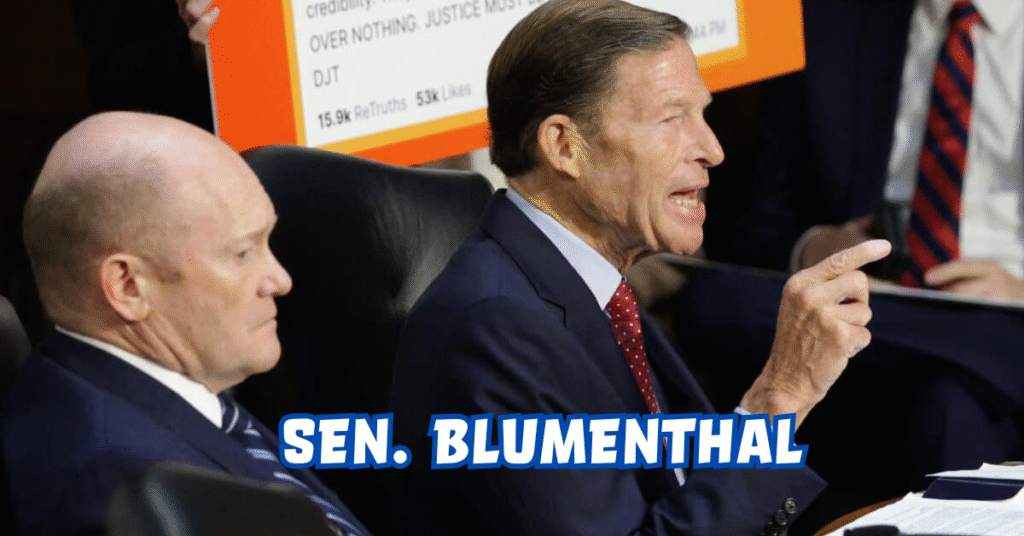Senator Richard Blumenthal has recently become the center of a fierce political storm after former President Donald Trump publicly declared he “should be allowed to speak no longer,” reigniting questions about Blumenthal’s past statements on his military service and the limits of free speech in American politics. In the first hundred words: Richard Blumenthal is a Democratic U.S. Senator from Connecticut, a former attorney general, and a prominent oversight critic of Trump. Trump’s remark is rooted in long-standing criticism of Blumenthal’s recounting of his military record, suggesting that Blumenthal misled the public and therefore forfeits the right to speak on certain matters. The episode underscores deep divisions in U.S. discourse over accountability, institutional norms, and the role of senators in public debate.
This article examines Blumenthal’s background, career, controversies, and the implications of Trump’s demand. We will also explore how this clash fits into broader themes of political weaponization, speech rights, and accountability in public office. Along the way, we provide perspective tables on his record and Trump’s claims, plus answers to frequently asked questions about this ongoing dispute.
Early Life, Legal Career, and Political Rise
Richard Blumenthal was born on February 13, 1946, in Brooklyn, New York, and later moved to Connecticut. He earned his bachelor’s degree from Harvard College and studied law at both Yale Law School and the University of Cambridge. Before entering national politics, he served as Connecticut’s Attorney General from 1991 to 2011, where he gained a reputation for consumer protection, environmental litigation, and challenging predatory corporate practices. His AG tenure included battles against insurance companies, tobacco manufacturers, and large corporations accused of deceptive practices.
Throughout those years, Blumenthal cultivated a public image as a champion of the “little guy” — someone willing to take on corporate interests and defend consumer rights. He leveraged that reputation to run for the U.S. Senate, winning election in 2010. He has since been reelected multiple times and has served on committees dealing with judiciary, armed services, and veterans’ affairs.
Blumenthal’s political style emphasizes oversight: pressuring executive branch actors, demanding transparency, and drawing attention to ethical controversies. His legal and political background has given him both tools and leverage to pose detailed questions in Senate hearings and public forums.
Overview of Senate Tenure and Key Policy Focus
In the Senate, Blumenthal has positioned himself as a legislator focused on justice, veterans, national security oversight, and regulatory enforcement. He has pushed for stronger consumer protections, tort reform, and accountability at federal agencies. Among his notable policy initiatives:
- Veterans Affairs and Services: As a senior member of the Senate Veterans’ Affairs Committee, Blumenthal has criticized budget cuts and staffing reductions affecting health care, benefits, and treatment services for veterans. New Haven Register
- Oversight of Justice Department and Executive Power: He frequently participates in Senate Judiciary and Oversight hearings, questioning administration appointees and government practices.
- Foreign Policy and Sanctions: He has advocated for stricter sanctions against Russia, particularly in the context of the Ukraine war. Politico
- Immigration and Enforcement: He has launched investigations into alleged abuses by agencies like ICE (Immigration and Customs Enforcement). CT Insider
His public posture often emphasizes institutional checks, transparency, and the defense of democratic norms — themes central to his recent confrontation with Trump.
The Speech Clash: Trump’s Attack and Senate Hearing
The current flashpoint began when, during a Senate Judiciary Committee oversight hearing, Sen. Blumenthal pressed U.S. Attorney General Pam Bondi on whether she had consulted with the president or his allies concerning the indictment of former FBI director James Comey or other political prosecutions. Tensions escalated when Bondi, under pressure, pushed back sharply, referencing Blumenthal’s past about his military statements. CT Mirror+2Deseret News+2
Shortly after the hearing, Trump posted to his social media platform that Blumenthal “should be allowed to speak no longer,” accusing him of being a “greatest phony in the history of the United States Senate” and referencing alleged lies about his military service. CT Mirror+2Military.com+2
In her defense, Bondi lashed out: “When you lied about your military service, you lie … you admitted you lied … to be elected a U.S. senator,” she said, challenging his integrity. Deseret News+1
The clash revived an old controversy that Blumenthal has acknowledged and apologized for: during earlier campaigns, he described or implied that he “served in Vietnam,” when in fact he was in the Marine Corps Reserve and not deployed overseas. Deseret News+3CT Mirror+3Military.com+3 Trump’s critics argue that his remarks amount to intimidation and censorship of a senator engaged in oversight; Trump’s defenders say they represent harsh but acceptable political discourse.
The Military Service Controversy: What Was Said, What Really Happened
Perhaps the most critical element at the heart of this storm is Blumenthal’s prior misstatements about his military service. The factual summary is as follows:
- Blumenthal served in the U.S. Marine Corps Reserve from 1970 to 1976. He was never deployed to Vietnam.
- During political campaigning, at times he used rhetoric that suggested, or might be interpreted as implying, active service in Vietnam (e.g., “the days I served in Vietnam”) — language critics said misled voters.
- He later acknowledged that he had “misspoken” on multiple occasions and expressed regret over ambiguities in his phrasing. Military.com+2NHPR+2
- Blumenthal contends that his constituent support indicates voters accepted the explanation, and that his record as a public official should stand on its own. CT Mirror+2Military.com+2
The controversy is not new; it has recurred in past elections and public debates. The recent hearing and Trump’s attack brought it back to the forefront. Critics argue that misrepresenting military service is dishonest and disqualifying; supporters maintain that his record of legislative performance and oversight remains valid regardless of past imprecision.
Table 1: Comparing Claims vs. Facts on Service
| Claim / Allegation | What Critics Say | Blumenthal’s Position / Facts |
|---|---|---|
| Implied “service in Vietnam” | Misleading to imply combat deployment | He had Reserve service; he later apologized for ambiguous phrasing |
| Use of military rhetoric | Effort to enhance credibility | He calls such phrasing inadvertent and partially self-corrected |
| Admission of lying | Critics assert full deception | He acknowledges “misspeaking,” not deliberate lying |
| Effect on legitimacy | Some argue disqualifies him from speaking | Blumenthal argues voters accepted him in multiple elections |
| Relevance to oversight authority | Trump says he should be silenced | Blumenthal maintains oversight mandate demands free speech |
Constitutional & Institutional Questions: Can a Senator Be Silenced?
Trump’s statement that Blumenthal “should be allowed to speak no longer” poses serious constitutional and institutional questions. The U.S. Senate operates under rules of debate, decorum, and the First Amendment. Silencing an individual senator — especially in expressing dissent or oversight — would challenge norms of representative democracy.
Key points:
- Senate Speech Protections: Senators have privilege in many deliberations; attempts to silence them would confront centuries of legislative precedent about debate rights.
- Checks & Balances: Blumenthal’s role in questioning executive officials is part of the Senate’s oversight duty — silencing him could be viewed as undermining that check.
- Precedent & Danger: If a senator can be labeled “unfit to speak” due to past misstatements, where does this logic stop? Critics warn it could lead to broader suppression of dissent.
- Political vs. Legal Action: Trump also called for an investigation, which blurs the line between political retribution and legal inquiry — a dynamic critics see as using the machinery of power to mute critics.
Blumenthal and his allies reject the attack as an authoritarian impulse. As he told reporters, he “will not be silenced or intimidated by bullying.” CT Mirror
Reactions, Support, and Political Forces
The fallout from Trump’s statement has lit up responses across the political spectrum:
- Democratic Senators have rallied in defense of Blumenthal, citing the importance of dissent and congressional oversight.
- Media Analysts have framed Trump’s remarks as escalation in his rhetorical war against critics.
- Legal Scholars express concern that the call to silence a senator poses risks to free speech and constitutional norms.
- Republican Backers tend to side with Trump’s critique, viewing Blumenthal’s past misstatements as fodder for undermining his legitimacy.
- Public Opinion is divided, with some viewing the issue as proof of hypocrisy and others seeing it as political mudslinging.
Some commentators draw attention to the pattern: whenever Trump faces scrutiny, he attacks the critic’s character or legitimacy rather than addressing the substantive questions. In doing so, he shifts public discourse from accountability to controversy.
Blumenthal’s response is that this attack is a distraction: “Donald Trump is lashing out because he doesn’t want to answer questions about why he’s directing DOJ to prosecute his political opponents, covering up conspiracies, or dropping antitrust cases against his cronies.” CT Mirror
Table 2: Timeline of Key Events Leading to the Clash
| Date / Year | Event | Significance |
|---|---|---|
| 1970–1976 | Blumenthal serves in Marine Corps Reserve | Basis of his military record |
| 2008 | Campaign-era statements suggest Vietnam service | First public controversy over phrasing |
| 2010 | Senate election | Voters reconcile controversy with support |
| October 7, 2025 | Senate Judiciary hearing with AG Bondi | Blumenthal presses tough questions |
| October 7/8, 2025 | Trump posts attack on Blumenthal | Calls to silence and investigating him |
The Risks and Stakes: What Is at Stake Here
This clash is not merely a personality dispute; it raises significant risks and stakes:
- Erosion of Legislative Norms: If senators can be publicly declared unfit to speak, the Senate might lose its capacity for robust debate.
- Weaponization of Power: Using executive or rhetorical force to punish critics may undermine separation of powers.
- Accountability Vacuums: If oversight figures like Blumenthal are intimidated or silenced, unchecked executive power could expand.
- Public Trust: Voters may grow disillusioned with politics tainted by character attacks rather than substantive governance.
- Precedent for Future Conflicts: This episode may set a pattern for future leaders to declare critics silenced for past infractions.
Defenders of Trump may argue that political opponents invite harsh scrutiny, but critics say that free expression and congressional questioning are foundational to democracy, and must not fall prey to personal attacks.
What Supporting Evidence Strengthens Blumenthal’s Position?
Several elements help Blumenthal mount a defense:
- Long Record of Public Service: His decades in public office provide a body of work beyond any singular misstatement.
- Transparent Acknowledgment: He has not denied the controversy; instead, he admitted to misphrasing and apologized, which many see as more credible than outright denial.
- Electoral Endorsement: He has been re-elected multiple times by Connecticut voters aware of the controversy.
- Constitutional Role: As a senator, his voice during oversight and debate has institutional legitimacy, separate from personal history.
- Focus on Substance: He continues to pose probing questions to executive authority, reinforcing that his role is not symbolic but functional.
In the public square, Blumenthal’s challenge is not just to defend himself, but to reinforce the principle that political office does not end in perfect record-keeping but in accountability, performance, and constitutional obligation.
Frequently Asked Questions (FAQs)
1. What exactly did Trump say about Blumenthal?
Trump tweeted that Blumenthal “should be allowed to speak no longer,” calling him a “phony” and referencing alleged lies about his military service. CT Mirror+2NHPR+2
2. Did Blumenthal ever serve in Vietnam?
No. Blumenthal served in the U.S. Marine Corps Reserve, stateside, and was never deployed to Vietnam. Some of his past campaign rhetoric implied otherwise, which he later said was a misstatement. Military.com+2NHPR+2
3. Can a senator be prevented from speaking?
Formally no, under Senate rules and constitutional protections. While decorum rules exist, public declarations that a senator should be silenced challenge norms of speech and legislative function.
4. Why is this clash happening now?
The clash followed Blumenthal’s forceful questioning of Attorney General Pam Bondi on potential interference by Trump in DOJ matters. Trump’s attack came as a response to being challenged publicly. CT Mirror+1
5. What does this mean for congressional oversight?
If successful, attempts to delegitimize outspoken senators could chill oversight, reduce aggressive inquiry, and weaken institutional checks on the executive branch.
Conclusion
Senator Richard Blumenthal’s confrontation with Donald Trump over speech and service is more than a political spar — it exposes tensions at the core of American democracy: accountability vs intimidation, truth vs personal attacks, institutional norms vs raw power. Blumenthal’s past misstatements about his military record are real and regretted by him, but they do not erase decades of public service or the constitutional role he plays. Trump’s incendiary demand that he be “allowed to speak no longer” raises urgent questions about free expression, legislative autonomy, and the future of dissent in the U.S.
As the drama unfolds, one truth remains: democracy is strongest when voices — even flawed ones — are allowed to speak, scrutinize, and debate. Silencing those voices over past errors risks making political accountability impossible. In this moment, Blumenthal’s defense is not just personal; it is part of a broader fight over whether American institutions can withstand intimidation or whether they bend to the pressure of the powerful.







